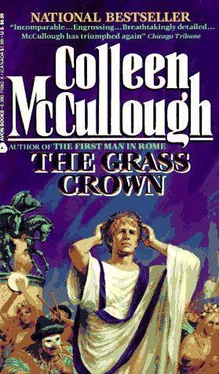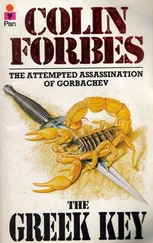Colleen McCullough - 2. The Grass Crown
Здесь есть возможность читать онлайн «Colleen McCullough - 2. The Grass Crown» весь текст электронной книги совершенно бесплатно (целиком полную версию без сокращений). В некоторых случаях можно слушать аудио, скачать через торрент в формате fb2 и присутствует краткое содержание. Жанр: Современная проза. Описание произведения, (предисловие) а так же отзывы посетителей доступны на портале библиотеки ЛибКат.
- Название:2. The Grass Crown
- Автор:
- Жанр:
- Год:неизвестен
- ISBN:нет данных
- Рейтинг книги:5 / 5. Голосов: 1
-
Избранное:Добавить в избранное
- Отзывы:
-
Ваша оценка:
- 100
- 1
- 2
- 3
- 4
- 5
2. The Grass Crown: краткое содержание, описание и аннотация
Предлагаем к чтению аннотацию, описание, краткое содержание или предисловие (зависит от того, что написал сам автор книги «2. The Grass Crown»). Если вы не нашли необходимую информацию о книге — напишите в комментариях, мы постараемся отыскать её.
2. The Grass Crown — читать онлайн бесплатно полную книгу (весь текст) целиком
Ниже представлен текст книги, разбитый по страницам. Система сохранения места последней прочитанной страницы, позволяет с удобством читать онлайн бесплатно книгу «2. The Grass Crown», без необходимости каждый раз заново искать на чём Вы остановились. Поставьте закладку, и сможете в любой момент перейти на страницу, на которой закончили чтение.
Интервал:
Закладка:
Well, Lucius Cornelius, isn't this a sorry business? I'm afraid my army isn't saying who did it, and I'm not about to punish four good legions for something only thirty or forty men took it upon themselves to do. My centurions are baffled. So is my son, who stands on excellent terms with the rankers and can usually find out what's going on. It's my fault, really. I just didn't realize how much my men loved me. After all, Quintus Pompeius was a Picentine. I didn't think they'd mind him one little bit. Anyway, I hope the Senate sees its way clear to keeping me on as commander-in-chief in the north. If the men wouldn't countenance a Picentine, they certainly wouldn't countenance a stranger, now would they? We're a rough lot, we northerners. I would like to wish you very well in all your own endeavors, Lucius Cornelius. You are a champion of the old ways, but you do have an interesting new style. A man might learn from you. Please understand that you have my wholehearted support, and don't hesitate to let me know if there is any other way in which I can help you.
Sulla laughed, then burned the letter, one of the few reassuring pieces of news he had received. That Rome wasn't happy with the Sullan alterations to the constitution he now knew beyond a shadow of a doubt, for the Plebeian Assembly had met and elected ten new tribunes of the plebs. Every man voted in was an opponent of Sulla and a supporter of Sulpicius; among them were Gaius Milonius, Gaius Papirius Carbo Arvina, Publius Magius, Marcus Vergilius, Marcus Marius Gratidianus (the adopted nephew of Gaius Marius), and none other than Quintus Sertorius. When Sulla had heard that Quintus Sertorius was putting himself up as a candidate, he had sent a warning to Sertorius not to stand if he knew what was good for him. A warning Sertorius had chosen to ignore, saying steadily that it could now make little difference to the State who was elected a tribune of the plebs. This signal defeat gave Sulla to understand that he must ensure the election of strongly conservative curule magistrates; both the consuls and all six praetors would have to be staunch proponents of the leges Corneliae. The quaestors were easy. They were all either reinstated senators or young men from senatorial families who could be relied upon to shore up the power of the Senate. Among them was Lucius Licinius Lucullus, who was seconded to Sulla's service. Of course one of the consular candidates would have to be Sulla's own nephew, Lucius Nonius, who had been a praetor two years before, and would not offend his uncle if elected a consul. The pity of it was that he was a rather insipid man who had done nothing so far to distinguish himself, and was therefore not going to be someone the electors fancied. But his choice as a candidate would please Sulla's sister, whom Sulla had almost forgotten, so little family feeling did he have. When she came to Rome to stay as she did periodically he never bothered to see her. That would have to change! Luckily Dalmatica was anxious to do what she could, and was an hospitable, patient kind of wife; she could look after his sister and the dreary Lucius Nonius, hopefully soon to be consul. Two other consular candidates were welcome. The erstwhile legate of Pompey Strabo, Gnaeus Octavius Ruso, was definitely for Sulla and the old ways; he probably also had orders from Pompey Strabo. The second promising candidate was Publius Servilius Vatia a plebeian Servilius but from a fine old family, and highly thought of among the First Class. Into the bargain, he had a very formidable war record, always an electoral asset. However, there was one candidate who worried Sulla greatly, chiefly because he would appear on the surface to the First Class as just the right kind of consular material, sure to uphold senatorial privilege and bolster knightly prerogatives, no matter how unwritten. Lucius Cornelius Cinna was a patrician of Sulla's own gens, he was married to an Annia, possessed of a luminous war record, and well known as an orator and advocate. But Sulla knew he had tied himself in some way to Gaius Marius probably Marius had bought him. Like so many senators, a few months ago his finances were well known to be shaky yet when the senators were expelled for debt, Cinna was discovered to be very plump in the purse. Yes, bought, thought Sulla gloomily. How clever of Gaius Marius! Of course it was to do with Young Marius and the accusation that he had murdered Cato the Consul. In normal times, Sulla doubted if Cinna could have been bought; he didn't seem that sort of man one reason why he was going to appeal to the electors of the First Class. Yet when times were hard and ruin loomed of a scale to affect a man's sons as well as his own future, many a highly principled man might allow himself to be bought. Particularly if that highly principled man didn't think his altered status would lead him to alter his principles. As if the curule elections were not worrying enough, Sulla was also aware that his army was tired of occupying Rome. It wanted to go east to fight Mithridates, and of course did not fully understand the reasons why its general kept lingering inside Rome. It was also beginning to experience increased resistance to its residence within the city; not that the number of free meals and free beds and free women had decreased, more that those who had never condoned its presence now were emboldened to retaliate by chucking the contents of their chamber pots out their windows onto hapless soldier heads. Had Sulla only been willing to bribe heavily, he might have ensured success in the curule elections, as the climate was exactly right for bountiful bribery. But for nothing and nobody would Sulla consent to part with his little hoard of gold. Let Pompey Strabo pay legions out of his own purse if he chose and let Gaius Marius say he was prepared to do the same; Lucius Cornelius Sulla regarded it as Rome's duty to foot the bill. If Pompeius Rufus had still been alive, Sulla might have secured the money from the wealthy Picentine; but he hadn't thought of that before he sent the wealthy Picentine north to his death. My plans are good but their execution is precarious, he thought. This wretched city is too full of men with opinions of their own, all determined to get what they want. Why is it that they can't see how sensible and proper my plans are? And how can any man draw sufficient power unto himself to ensure his plans remain undisturbed? Men of ideals and principles are the ruin of the world! And so toward the end of December he sent his army back to Capua under the command of the good faithful Lucullus, now officially his quaestor. Having done that, he threw caution to the winds and his chances into the lap of Fortune by holding the elections. Though he was convinced he had not underestimated the strength of the resentment against him in every stratum of Roman society, the truth was that Sulla did not grasp the depth and the extent of that animosity. No one said a word, no one looked at him awry; but beneath this lip service the whole of Rome was finding it impossible to forget or forgive Sulla's bringing an army into Rome or Sulla's army holding its allegiance to Sulla ahead of its allegiance to Rome. This seething resentment ran from the highest echelons all the way down into the very gutter. Even men as inescapably committed to him and to the supremacy of the Senate as the Brothers Caesar and the Brothers Scipio Nasica wished desperately that Sulla could have lit upon some other way of solving the Senate's dilemma than using his army. And below the First Class there were two additional ulcerations festering inside men's minds; that a tribune of the plebs had been condemned to death during his year in office, and that the old and crippled Gaius Marius had been hounded out of home, family, position and condemned to death. Some hint of all this rankling dissatisfaction became apparent as the new curule magistrates were returned. Gnaeus Octavius Ruso was the senior consul, but the junior consul was Lucius Cornelius Cinna. The praetors were an independent lot, among whom were none Sulla could really count on. But it was the election of the tribunes of the soldiers in the Assembly of the Whole People that troubled Sulla most of all. They were uniformly ugly men, and included wolfs-heads like Gaius Flavius Fimbria, Publius Annius, and Gaius Marcius Censorinus. Ripe to ride roughshod over their generals, thought Sulla let any general with this lot in his legions try to march on Rome! They'd kill him with as little scruple as Young Marius did Cato the Consul. I am very glad I am passing out of my consulship and won't have them in my legions. Every last one of them is a potential Saturninus.
Читать дальшеИнтервал:
Закладка:
Похожие книги на «2. The Grass Crown»
Представляем Вашему вниманию похожие книги на «2. The Grass Crown» списком для выбора. Мы отобрали схожую по названию и смыслу литературу в надежде предоставить читателям больше вариантов отыскать новые, интересные, ещё непрочитанные произведения.
Обсуждение, отзывы о книге «2. The Grass Crown» и просто собственные мнения читателей. Оставьте ваши комментарии, напишите, что Вы думаете о произведении, его смысле или главных героях. Укажите что конкретно понравилось, а что нет, и почему Вы так считаете.












